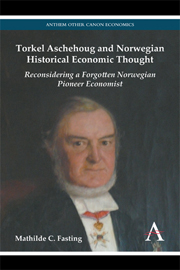 Torkel Aschehoug and Norwegian Historical Economic Thought
Torkel Aschehoug and Norwegian Historical Economic Thought Book contents
- Frontmatter
- Contents
- Acknowledgements
- Chapter 1 Introduction
- Chapter 2 Biography
- Chapter 3 Norwegian Economic and Political Context in the Nineteenth Century
- Chapter 4 Norwegian Economic Thought and Method
- Chapter 5 Development of the Economic Thought of Aschehoug: Statsøkonomisk Forening and the Socialøkonomik Project
- Chapter 6 The German Historical School: Similarities, Influences and Discrepancies
- Chapter 7 Alfred Marshall: Aschehoug and the Adoption of Marginal Theory
- Chapter 8 The French Influence: Adopting Say and Refuting Socialism
- Chapter 9 Views of Labour in the Work of Aschehoug
- Chapter 10 The Entrepreneur: The Fourth Production Factor
- Chapter 11 Trade and Customs Debates from 1840 to 1906
- Chapter 12 The Theory of Economic Crises
- Chapter 13 The Legacy of Aschehoug: Concluding Remarks
- Appendix A Other Norwegian Turn-of-the-Century Economists
- Appendix B Drafts for Socialøkonomik
- Appendix C Detailed Contents of Socialøkonomik (First Editions from 1903 to 1908)
- Notes
- Literature
- Index
Chapter 3 - Norwegian Economic and Political Context in the Nineteenth Century
Published online by Cambridge University Press: 05 March 2014
- Frontmatter
- Contents
- Acknowledgements
- Chapter 1 Introduction
- Chapter 2 Biography
- Chapter 3 Norwegian Economic and Political Context in the Nineteenth Century
- Chapter 4 Norwegian Economic Thought and Method
- Chapter 5 Development of the Economic Thought of Aschehoug: Statsøkonomisk Forening and the Socialøkonomik Project
- Chapter 6 The German Historical School: Similarities, Influences and Discrepancies
- Chapter 7 Alfred Marshall: Aschehoug and the Adoption of Marginal Theory
- Chapter 8 The French Influence: Adopting Say and Refuting Socialism
- Chapter 9 Views of Labour in the Work of Aschehoug
- Chapter 10 The Entrepreneur: The Fourth Production Factor
- Chapter 11 Trade and Customs Debates from 1840 to 1906
- Chapter 12 The Theory of Economic Crises
- Chapter 13 The Legacy of Aschehoug: Concluding Remarks
- Appendix A Other Norwegian Turn-of-the-Century Economists
- Appendix B Drafts for Socialøkonomik
- Appendix C Detailed Contents of Socialøkonomik (First Editions from 1903 to 1908)
- Notes
- Literature
- Index
Summary
This chapter will give an outline of the Norwegian economic and political context in the nineteenth century. The main emphasis will be on Anton Martin Schweigaard in order to trace the origins of Aschehoug's thought. Other earlier economists are only mentioned briefly when appropriate. In order to understand the small and backward country Norway was at the beginning of the century, and how much it had changed by the time of Aschehoug's death in 1909, this outline will show different aspects and theories of this development. The role of active politics in order to create a well-functioning economy is also mentioned. To a Norwegian reader, this outline may be well-known history. The aim is nevertheless to present the early framework in which Aschehoug grew up and worked.
The Norwegian Political and Social Context in the Nineteenth Century
To understand what kind of economic approach was adapted in Norway during the nineteenth century, a summary of the general Norwegian context and political system is necessary. The development of Norway from a small, rural country to a modern industrial power started and progressed during the nineteenth century. Society was created in the tension between the embetsstand (intellectuals/bureaucrats) and the popular movements — firstly the free Norwegian landholders, later the labour movements. The authors of Norske idéhistorie, as well as the philosopher Gunnar Skirbekk in his new analysis of Norwegian modernity, Norsk og moderne, underline that the development was distinctly Norwegian (or Scandinavian) — not, as is often claimed, just an adaptation of European experiences.
- Type
- Chapter
- Information
- Torkel Aschehoug and Norwegian Historical Economic ThoughtReconsidering a Forgotten Norwegian Pioneer Economist, pp. 27 - 50Publisher: Anthem PressPrint publication year: 2013


